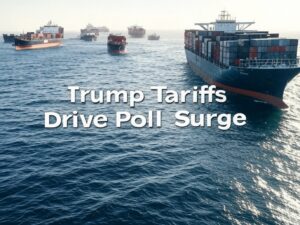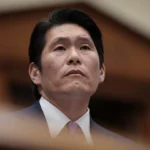⚡ Cutting through noise. Spotlighting the truth.
Trump Tariffs Drive Poll Surge

Approval Jumps 4 Points as Trade Policy Divides Voters
President Trump’s bold return to tariff-based trade strategy is pushing more than just international boundaries—it’s pushing his approval numbers up. As of early April 2025, a Daily Mail report highlighted a 4-point jump in Trump’s national approval rating, from 49% to 53%. The spike is credited largely to his sweeping new tariffs, and while critics call it reckless, supporters are hailing it as a long-overdue correction to America’s lopsided trade deals. Trump tariffs approval rating signals strong support.
As economic debate intensifies, what’s clear is this: Trump’s trade war 2.0 is winning back populist support. Whether it can hold under global pressure—and domestic pushback—remains the next test. Trump tariffs approval rating signals strong support.
The Populist Case: “America First” Strikes Again
Trump’s latest tariffs aren’t just policy—they’re branding. Targeting auto parts, steel, electronics, and imports from strategic rivals like China, the tariff rollout revives the America First platform in raw form. The messaging? Simple: America should not be subsidizing foreign economies at the expense of its own workforce.
X reactions show the narrative sticking. Charlie Kirk led the charge, celebrating the “53% approval surge” as a win for “forgotten men and women.” Supporters like @ProudElephantUS and @MAGAVoice rallied around the move as proof that the base is re-energizing. Even @TheQuartering posed the question: “Why can other countries have tariffs but not us?”
The energy is familiar—and intentional. This isn’t just about economics; it’s about cultural sovereignty and a rebuke of elite globalism.
Critics Warn of Cost and Chaos
While Trump’s base is cheering, economic experts and even some conservative lawmakers are raising red flags. The Tax Foundation warns that the tariffs could cost the average U.S. household $1,900 in 2025. A Reuters/Ipsos poll from March showed that 57% of Americans viewed Trump’s economic approach as erratic, and 70% anticipated rising consumer prices.
Markets reacted fast. The STOXX Europe 600 dropped 2.7%, Tokyo’s Nikkei fell 2.8%, and AP News reported global unease over potential retaliatory tariffs from the EU, India, and other trade partners.
Senator Chuck Grassley and Representative Don Bacon have both pushed back, introducing the Trade Review Act—a bipartisan bill to force future tariffs through Congress. Their message: tariffs may be necessary, but executive overreach isn’t.
The Numbers Don’t Lie—But They Do Shift
Polls tell two different stories, depending on when you check. The same Reuters data that showed Trump at 43% approval post-announcement contradicts the Daily Mail’s 53% one week later. What changed? Framing—and follow-up.
Trump’s administration moved fast to control the narrative. @BillAckman posted a thread describing Trump’s tariff blitz as a “shock-and-awe negotiation strategy.” The idea: cause enough disruption that other nations rush to the table—many already have. Israel, India, Japan, Vietnam, and parts of the EU have hinted they’d lower tariffs if the U.S. reciprocates.
Supporters see this as leverage in motion. Critics say it’s chaos disguised as strategy.
A Fight Over Who Runs Trade
Beyond approval ratings, this is shaping into a constitutional tug-of-war. Should the executive branch unilaterally reshape trade policy? Grassley says no. Trump’s team argues yes—especially when foreign competitors aren’t waiting on Congress to act.
This is where the libertarian streak intersects with populist nationalism. Free markets don’t mean passive policy. Trump’s camp sees tariffs as tools, not ideology.
For voters who believe trade policy should protect Americans first and be agile in the face of rising global threats, the Trump tariffs approval rating bump is proof that boldness still resonates.
Conclusion and Takeaways
- Trump’s approval rating jumped 4 points to 53% after new tariffs, reflecting renewed populist support.
- Critics cite economic risks, including household costs and potential recession effects.
- Global reaction is mixed, with both threats and negotiation signals emerging.
- Congressional Republicans are split, with some pushing to limit executive tariff power.
Sources and Further Reading
Daily Mail
www.reuters.com
taxfoundation.org
apnews.com
www.theguardian.com
https://x.com/charliekirk11
https://x.com/BillAckman
Watch for updates and new articles on The SpotlightX




